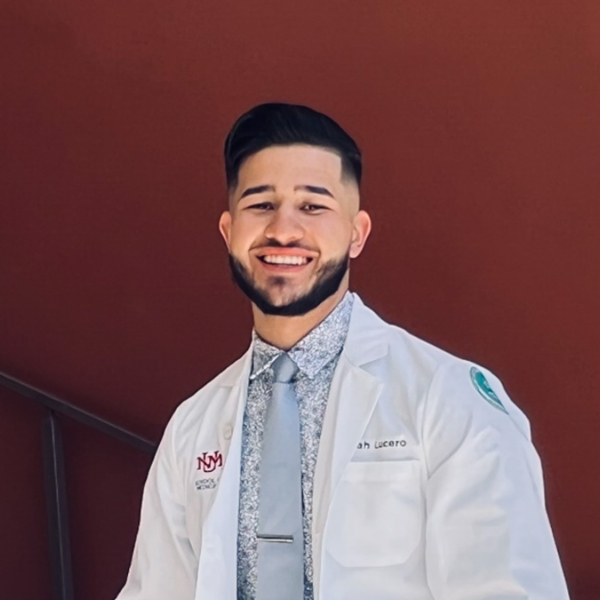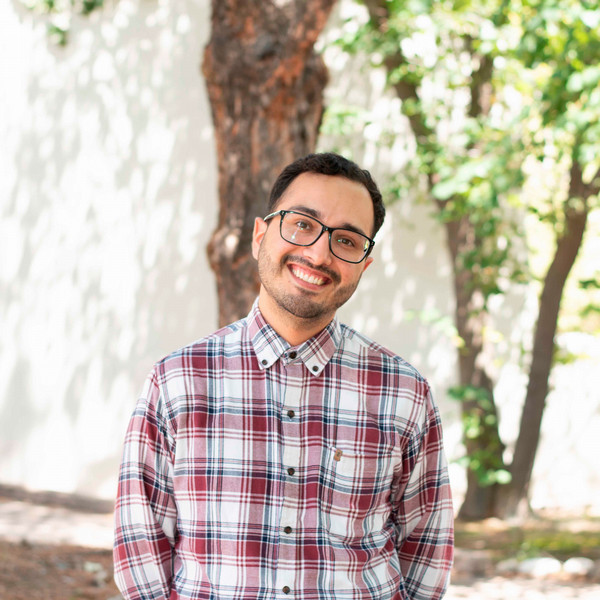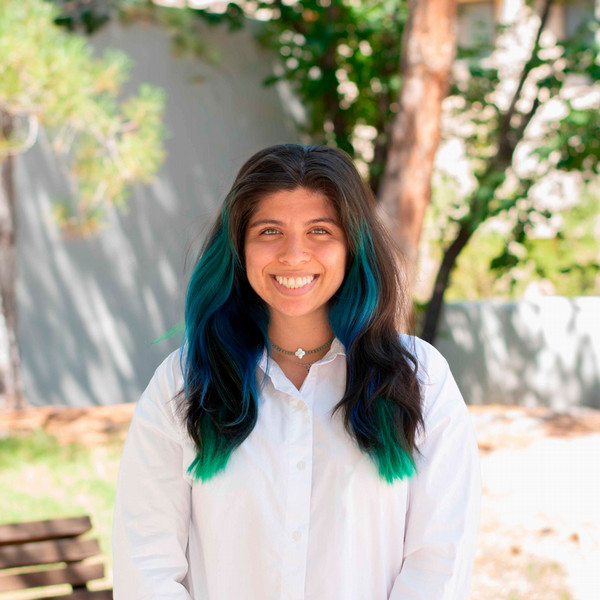El Puente Graduate Research Fellows

Noah Lucero
Noah Lucero is a life-long New Mexican raised in Albuquerque and the surrounding area. He earned his B.S. in Biochemistry with Honors from the University of New Mexico (UNM) in 2022 and is now a fourth-year medical student at UNM School of Medicine pursuing anesthesiology. He leads quality-improvement and research initiatives, including pediatric appendicitis imaging and perioperative OR-to-ICU handoff projects, and received a departmental travel award to present at the ASA 2025 meeting.
Dedicated to mentorship and community service, Noah has served as Learning Community House Chair and Continuous Quality Improvement Liaison, and volunteers at One Hope Centro de Vida Clinic caring for Albuquerque’s uninsured and undocumented populations. A former El Puente Undergraduate Fellow, he is excited to return as a Graduate Research Fellow, mentoring future scholars while advancing health equity. Outside medicine, Noah enjoys running, tennis, yoga, baking (recently mastering apple pie), live music, and exploring New Mexico’s vibrant food scene with family and friends.
Research Statement: Currently, Noah leads a quality-improvement project on perioperative OR-to-ICU handoffs (NEST/PNEST) and collaborates on pediatric appendicitis imaging research, assessing diagnostic accuracy and care pathways. He has previously explored access to and perceptions of genetic screening for the Common Hispanic Mutation of cerebral cavernous malformation and studied the role of brain-derived neurotrophic factor in spinal cord regeneration. His work reflects a consistent focus on patient safety, evidence-based perioperative care, and equitable access to advanced diagnostics and treatments.
Areas of Intrest: Noah’s research interests include hospital medicine, perioperative and critical care quality improvement, anesthesiology education, and conditions that disproportionately affect Latinx and underserved populations. He is also drawn to investigating atypical disease presentations and improving systems of care that impact surgical and intensive care outcomes.
Mentoring Philosophy: As a former El Puente Undergraduate Research Fellow, Noah experienced firsthand how thoughtful mentorship can spark curiosity and open doors in academic medicine. Returning as a Graduate Research Fellow, he aims to help undergraduates overcome structural barriers common at minority-serving institutions like UNM. He values individualized guidance and recognizes that traditional approaches may not fit every student. By connecting mentees with tailored resources and community networks, Noah fosters confidence and resilience, encouraging students to pursue meaningful, self-directed research and successful careers in health and science.

Alejandro Tovar
I am from San Luis Rio Colorado, Sonora, México. I am the fifth of seven children. I am in graduate school thanks to my mother quien nos ha dado todo lo que temenos. Ten years ago, mi jefita decided to cross the border and move to the United States, searching for a better future for us. We established ourselves to a small town in the San Luis Valley, Center Colorado. I am a son of a migrant, seasonal and temporary farmworker. I was astonished, confused, and sorrowful for leaving mi familia y amigos and I had to start high school again, plus learn a new language and culture while suffering discrimination, racism, and xenophobia. However, my mother and sister, together with my ESL teacher and staff in the Migrant Education Program me respaldaron para continuar mi educación, seguir adelante. I attended Adams State University as a scholar for the College Assistance Migrant Program (CAMP), which provided me academic, social, and financial support to succeed. Además se convirtieron en mi familia, me dieron un sense of belongingness and empowerment que lo sostengo firme. I am currently a PhD student representando a mi gente and saying loud and proud SI SE PUEDE.
Research Statement: My passion for advocating, supporting, and representing migrant and immigrant students led me to join CAMP professionally after graduating college. Even though I was fulfilling my dream of helping my people attain higher education, the reality is that I keep observing the same patterns of educational, social, and economic inequities in all the neighborhoods. My aspiration to pursue a graduate degree is to be able to academically, professionally, and socially assist underserved groups that tend to be ignored. The areas of specialization that I am passionate about and appeal to me are migrant, seasonal, and temporary farmworkers and immigration. I would like to investigate, analyze, and identify the factors that maintain the maltreatment, oppression, and discrimination against these marginalized groups, as well as the approaches that can successfully support and empower them. To address these inquiries, I conduct qualitative research to bring the experiences, stories, and viewpoints of migrant, seasonal, and temporary farmworkers and immigrant people and their families.
Areas of Reasearch: Race and Ethnicity, Gender, Migrant Farmworkers, Immigration, Intersectional Studies, Education, Critical Race Theory, Latino Youth Outcomes
Mentoring Philosophy: My philosophy of working with underrepresented students is through a pedagogy of decolonizing epistemology. I encourage students to share their experiences, knowledge, and ideas as valid, meaningful, and valuable. Even though academia is under the control of Eurocentric colonial epistemology that oppresses and dismisses marginalized scholars, particularly those who do not fit the white male cisgender body, I dismantle such narratives that create a hierarchy that classifies, differentiates, and separates people from their communities, background, and culture. I highlight the importance of the positionality of each person in constructing and producing knowledge and ignorance. Marginalized students should not be molded or changed in order to become scholars; marginalized students, as they are, with their culture, experiences, ideas, and background, are scholars who carry generational and personal knowledge. They do not need to disassociate themselves from their identity because that helps them see the things happening in their communities and the world.

Jasmine Ruby Hernandez
I was born and raised in the Los Angeles area of Southern California. I received my Bachelor of Arts in Anthropology from the University of California, Berkeley and my Master of Science in Human Skeletal Biology from New York University. While in New York, I taught Forensic Anthropology at NYU as well as Forensic Anthropology and Forensic Science at Brooklyn College, where I discovered a joy in working with and teaching undergraduates. I am a third year PhD student in the Evolutionary Anthropology program at UNM with a focus in forensic anthropology. As a graduate student I am a research assistant on a Missing and Unidentified Human Remains (MUHR) grant where I aid in the re-investigation of cases from the Office of the Medical Investigator (OMI) in Albuquerque, NM have gone cold. Reflecting on my academic journey and achievements to date, I cannot help but credit my parents. Their unconditional support and unwavering encouragement have provided me with the determination to persevere.
Research Statment: My research is rooted in my desire to help the Latin American community. The US faces a migration crisis along its southern border, driven by conflicts abroad and internal migration policies. For years, migrants have risked their lives crossing harsh terrain to enter the US. Recent policy changes have led to increased migration and an unknown number of migrant deaths. In the last year, New Mexico has seen a drastic increase in their migrant caseload. Outside of my involvement with the MUHR grant I also help track these deaths in NM and am working towards improving forensic anthropology methods to aid the identification and return of these individuals to their loved ones.
Areas of research: Biological anthropology, forensic anthropology, population affinity, identification of migrants along the Mexico-US border, histology
Mentoring Philosophy: My mentoring philosophy derives from my personal experiences in higher education. As I navigated my undergraduate and graduate career, I often felt out of place in unfamiliar spaces. The isolation stemmed from a tangible distance from my family and community and a lack of understanding of academia's inner workings. With the help of my mentors, I learned how to navigate these feelings and the academic sphere, now feeling more confident in the space I am taking. Through a compassionate approach, my goal is to make my mentees feel supported throughout their time at UNM and beyond, providing them with a toolkit to persevere in the face of adversity. I aim to communicate their sense of belonging in their academic space, giving them the confidence to draw from their lived experiences, which have likely shaped their research interests and academic and personal goals. I strongly believe that mentors can alter the academic and personal trajectories of their mentees, and I hope to serve as a positive role model and resource for mine.